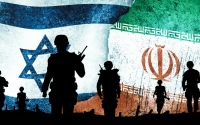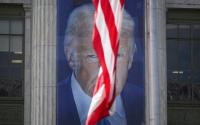Democracy Cannot Coexist with Bush's Failed Doctrine of Preventive War
Common Dreams / Published on Wednesday, December 3, 2003 by the Los Angeles TimesBenjamin R. Barber
In his historic speech at the National Endowment for Democracy recently, President Bush embraced a new doctrine, a "formal strategy of freedom" in the Middle East — and he did it just in the nick of time.
For although the war in Iraq is won, the peace has been lost, and that other Bush doctrine, the "preventive war" doctrine, is in disarray. The United States can neither withdraw with honor — anarchy, civil war and renewed tyranny probably would result — nor stay and fight on into a Vietnam-style quagmire, which is what the new Baathist-terrorist alliance is obviously hoping for. Bush's dilemma was evident in his Thanksgiving visit to Baghdad — a couple of hours with his fortressed troops but not a minute with the "liberated" Iraqis.
The only alternative to withdrawal or quagmire is for the U.S. to succeed in its campaign for genuine democratization, which is the option the president has chosen. Unfortunately, he has done so without relinquishing preventive war or the faulty logic behind it.
The problem for the administration, already clear from the cries of "hypocrisy!" with which his "freedom strategy" is being met in some quarters, is that there is a startling gap between the president's welcome rhetoric about democracy and a policy that allows for unilateral invasion of other countries when the U.S. feels threatened, whether or not it has actually been attacked. It is this tension between democratization and preventive war that is at issue in Iraq.
Bush noted in his speech that democracy spread in the late 20th century because dictatorships collapsed from within or were overthrown by people demanding their liberty, just as the United States seized its freedom from the British in the 18th century. Yet in Iraq, the U.S. is trying to impose democracy at the barrel of a gun. But we cannot logically be an ardent advocate of the internal struggle for democracy and at the same time assert our unilateral right to invade enemies of our own choosing.
Bush urges the Saudis and Egyptians to press for democracy, but Washington continues to arm and fund undemocratic governments in both countries because they are putative allies in the war on terrorism. The president speaks of a "forward strategy of freedom in the Middle East," but anti-terrorist tactics mandate strategic alliances with tyrants — on the model of U.S. support for Saddam Hussein in the 1980s, when Iran was the greater enemy. The U.S. must make up its mind: Are we to be friends of democracy or friends of the enemies of our enemies?
Bush admirably condemns what Ronald Reagan called "cultural condescension" and rightly insists that Islam and democracy are compatible (look at Turkey, Indonesia, Malaysia, Bangladesh, Albania, Bahrain and Niger). Yet the administration seems afraid to trust the Shiites in Iraq, afraid they might be too fundamentalist, too prone to the seductions of terrorism.
The fact is that the U.S. often doesn't really want democracy — what it actually wants is an assent to its policies. That's why the U.S. sided with the French in 1991 when the Algerian elections were "canceled" because of the possibility of an Islamic victory. That's also why it fussed when Turkey's democrats voted to deny American soldiers a Turkish route to northern Iraq before the war.
Bush wants democracy for others, but apparently on an American schedule dictated by a concern for "stability" and the war against terrorism. Yet imagine Britain acknowledging the American Declaration of Independence but suggesting it be implemented on a British timetable.
Citizenship must be learned, and power must be responsibly used, but the best and only democratically acceptable means for learning responsibility is empowerment. Democracy is the right of people to make their own mistakes. As T.E. Lawrence — Lawrence of Arabia — wrote, it is "better to let them do it imperfectly than to do it perfectly yourself, for it is their country … and your time is short."
That is what real democracy requires. Can a United States of America committed to preventive war allow it?
Balancing American support for world democracy with world distrust for American empire requires consistency between theory and practice. It demands that the U.S. decide whether the war on terrorism trumps everything, including its own liberties, or whether the quest for a democratic world will now replace preventive war as Washington's primary foreign policy doctrine.
It is hard for the U.S. to be the beacon of freedom that Bush's speech celebrated — and the world so admires — when it has in many places come to be seen as the maker of war the world most fears. It is hard to lead a global struggle for human rights when the U.S. holds enemy aliens prisoners without rights and when Americans who criticize the preventive-war policy are vilified.
Democracy is a high ideal. It exacts a high price from those who champion it. Bush can pursue an inspirational foreign policy founded on democratization that will transform how the U.S. spends money, cooperates with others and forges alliances. Or he can persist in following a failed doctrine of preventive war aimed at defeating terrorism, whatever costs such a campaign may exact from democratic ideals at home and abroad. But he cannot pursue both.
Benjamin R. Barber is a University of Maryland political scientist and the author of "Jihad vs. McWorld: How Globalism and Tribalism Are Reshaping the World" and the newly published "Fear's Empire: War, Terrorism, and Democracy"






